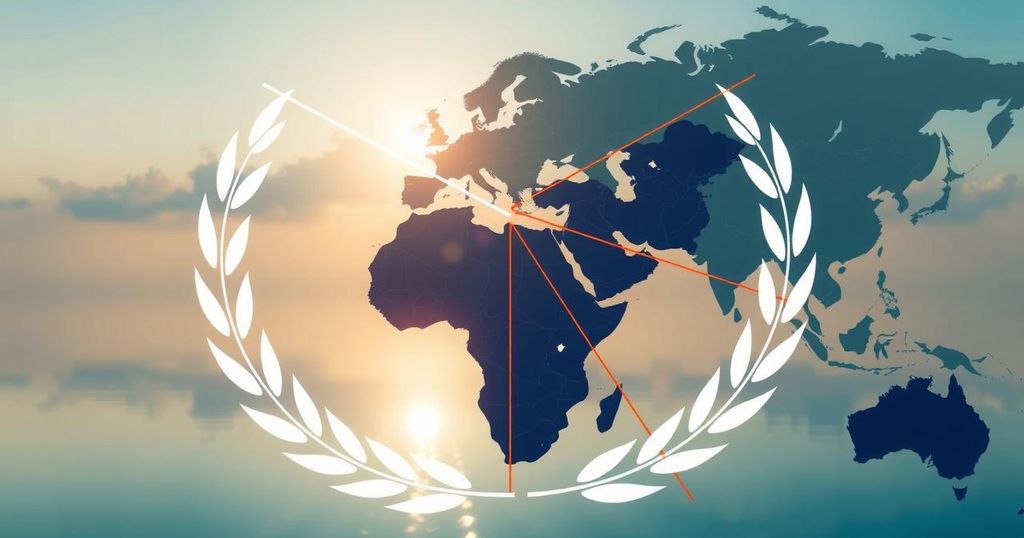Lebanon is preparing for significant diplomatic visits from Jordan’s FM, UN chief, and French President following the election of President Joseph Aoun. Minister al-Safadi expressed optimism about Lebanon’s recovery, emphasizing the importance of Israel’s adherence to ceasefire agreements and plans for Jordanian electricity exports. Qatar’s ongoing support for the Lebanese military was also reaffirmed. President Macron’s visit aims to support Lebanon’s sovereignty and advocate for reforms. UN Guterres will discuss ceasefire oversight during his visit.
Lebanon is set to experience significant diplomatic engagements, beginning with the arrival of Jordan’s Foreign Minister Ayman al-Safadi in Beirut, followed by the anticipated visits from UN Secretary-General Antonio Guterres and French President Emmanuel Macron. The recent election of President Joseph Aoun marks the end of a two-year political impasse, with hopes for a new cabinet headed by former ICJ judge Nawaf Salam due soon.
During his meeting with President Aoun at the Baabda Palace, Minister al-Safadi expressed confidence that the new leadership could steer Lebanon back toward becoming a vital economic and cultural center in the region. He voiced the urgent need for reconstruction efforts after the catastrophic aftermath of the recent Israeli-Hezbollah conflict, which inflicted extensive devastation in southern Lebanon and claimed numerous lives.
Al-Safadi underscored the importance of Israel adhering to the ceasefire terms established last year, which included the withdrawal of Israeli forces from southern Lebanon. He highlighted ongoing violations by the Israeli army, stating that Lebanon’s military must uphold the ceasefire and dismantle unauthorized military installations.
Additionally, Minister al-Safadi discussed plans to export electricity from Jordan to Lebanon, an initiative hindered by US sanctions on Syria. He met with other key Lebanese leaders, including Parliament Speaker Nabih Berri and Prime Minister Salam, emphasizing enhancing bilateral relationships between Jordan and Lebanon.
On a separate note, Qatar’s Ambassador to Lebanon conveyed an invitation for President Aoun to visit Doha, reaffirming Qatar’s commitment to support the Lebanese army in 2025 and throughout various sectors. This continued support has been crucial for Lebanon’s military amid ongoing financial challenges.
In a show of international support, President Macron is scheduled to arrive in Beirut to congratulate Aoun on his election, marking his first visit since 2020. Macron’s return signifies France’s ongoing involvement in fostering political stability in Lebanon, urging reforms within the ruling elite.
Moreover, Secretary-General Guterres’s upcoming visit will involve chairing a meeting of the ceasefire committee engaging various nations to discuss Israel’s military withdrawal and the Lebanese army’s re-deployment in border areas. Such international engagements illustrate the global interest in stabilizing Lebanon’s political and security dynamics.
The diplomatic landscape in Lebanon has been turbulent, especially following the election of President Joseph Aoun, which ended a protracted political deadlock. In light of these recent developments, Jordanian and Qatari officials’ engagements signal a concerted effort to assist Lebanon in rebuilding both politically and economically. The unfolding situation suggests a potential shift in Lebanon’s trajectory, with increased international focus on its challenges from military incursions to energy crises.
In summary, Lebanon is witnessing a pivotal moment of diplomatic outreach from neighboring countries and global leaders following the election of President Joseph Aoun. The involvement of Jordan and Qatar, along with anticipated visits from France and the UN, reflects a shared interest in revitalizing Lebanon’s political stability and recovery efforts in the post-conflict context. Ensuring adherence to ceasefire agreements and fostering economic cooperation remain vital as Lebanon navigates its future.
Original Source: www.newarab.com






